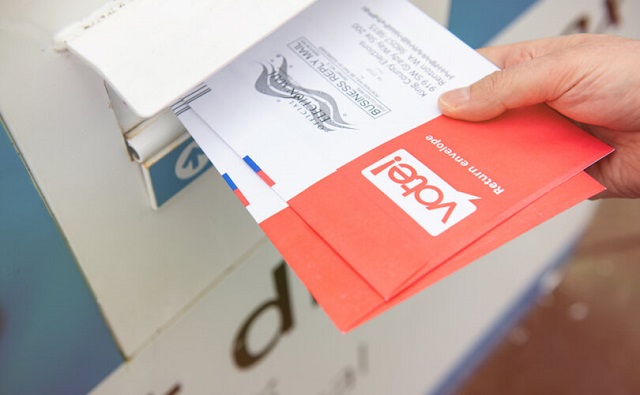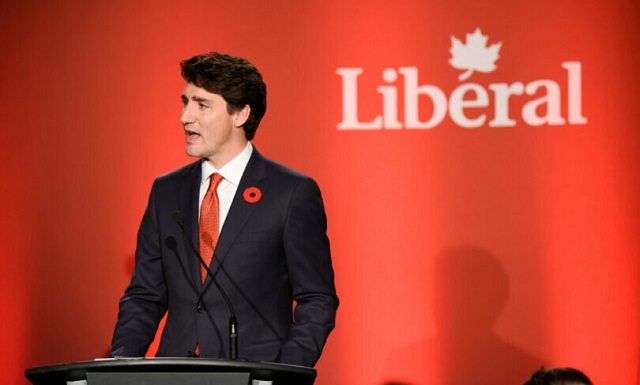Business
‘Controligarchs’ lays bare a nightmare society the globalist elites have in store for humanity

From LifeSiteNews
Journalist Seamus Bruner has published new details on globalist plans to dominate every aspect of our lives, including our food, movement, and transactions
A newly released book gives a fresh, well-documented look into the nightmarish, dystopian society that billionaire globalists are shaping for humanity, in which our every movement and transaction will be tracked, our food will be restricted, and our perception of reality will be heavily manipulated.
Controligarchs: Exposing the Billionaire Class, their Secret Deals, and the Globalist Plot to Dominate Your Life is a thoroughly researched book by investigative journalist Seamus Bruner detailing the global game plan of what he refers to as a new class of oligarchs. They are distinguished from ultra-wealthy elites of the past by the unprecedented level of control they can exercise over the masses through technology, not just over one nation, but over the whole world.
Bruner shows how the globalist elites plan to impose a new kind of serfdom by controlling nearly every facet of our lives, with different billionaires specializing in different areas, beginning with what is most personal to us — our bodies.
After giving a bird’s eye view of the globalists’ plans through the lens of the Great Reset, Bruner dives into each of the globalists’ main levers of power over society, which exert control, respectively, over what goes into our bodies; over home energy use and transportation; over local politics and law enforcement; and over information access and perception.
The journalist first shows how Bill Gates, who already exercises massive sway over world health policy through the World Health Organization (WHO) and investments in vaccines, is also heavily investing in a root source of health: the food supply.
Bruner explains in his book that the “takeover of the food” is accomplished by “controlling the intellectual property of food production through trademarks, copyrights, and patents.” This has already been seen in Gates’ funding and control of seed patents, and in his push for patented synthetic fertilizers, discussed by Bruner, which have caused considerable damage to health and small farms around the world.
The next phase of Gates’ food power grab, which has already begun, involves tighter control over farming through land and water grabs, as well as a push to replace meat consumption with that of synthetic and bug protein.
Bruner emphasizes in his book the importance of control over the water supply, writing, according to the New York Post, “When Gates buys tens of thousands of acres, he is not just buying the land — he is also buying the rights to water below ground. In addition to farms (and the irrigation) and fertilizer, Gates has been hunting for sizable interests in water and water treatment — a crucial component when seeking to control the agricultural industry.”
The journalist also examines how Gates and the “tech oligarchs” are pushing meat alternatives, ostensibly for the sake of the climate.
“I was horrified to learn about the lab-grown hamburgers, fermented fungi protein patties, and even insect-based protein shakes they are hoping the public will consume,” wrote Peter Schweizer, president of the Government Accountability Institute (GAI) and senior editor-at-large of Breitbart News, in his foreword to the book.
Gates has invested millions in companies like Beyond Meat and Impossible Foods, which have already received more than two dozen patents for their synthetic meat and dairy products, and have more than 100 patents pending, according to Bruner. The alternatives aren’t popular now, but about two-thirds of Americans are reportedly willing to try it.
Breitbart reports that Controligarchs also documents the efforts of Mark Zuckerberg to make the Metaverse, a virtual reality platform linked to the internet and operated by Zuckerberg’s Meta Platforms, Inc. (formerly Facebook), “the most addictive product in history.”
Meta and three of its subsidiaries have already been sued by the attorneys general of dozens of U.S. states for having “knowingly designed and deployed harmful features on Instagram and Facebook to purposefully addict children and teens.”
In comparison, the Metaverse, which has been described by the World Economic Forum’s Cathy Li as a kind of virtual world that will “become an extension of reality itself,” and which is designed to feel real with the help of virtual reality (VR) headsets and sensors, has the potential to become far more addictive than mere social media.
While it is still in the process of being developed, progress is steadily being made toward its widespread use. For example, last Thursday, Meta announced a new strategic partnership with China’s Tencent to make VR headsets cheaper and more accessible, according to Breitbart.
And this summer, Apple announced that it would release its own set of augmented reality glasses, called Apple Vision Pro, next year in the U.S.
The plans for the Metaverse get wilder — and for some, creepier. Meta AI researchers are working on a synthetic “skin” “that’s as easy to replace as a bandage,” called ReSkin, as well as “haptic gloves,” so that Metaverse users can “literally feel and grasp the metaverse.”
If it indeed becomes commonplace, as is planned, the Metaverse has enormous implications for society. Perhaps the most serious is that, as John Horvat II has observed, people will feel free to carry out “every fantasy, even the most macabre,” and perceive that they can do things to others “without consequences.”
“Such a lonely world disconnected from reality and the nature of things can feed the unfettered passions that hate all moral restraint. A space like this can quickly go from Alice in Wonderland to insane asylum,” Horvat noted.
Activities performed “in” the Metaverse would also be monitored by the platform’s administrators, drastically diminishing privacy for all Metaverse users.
The assimilation of everyday activities into the World Wide Web via the Metaverse also raises the question of whether any speech performed while “plugged in” to the Metaverse can be regulated by its administrators. Such unprecedented regulatory power would resemble that of a global government, which is an explicit goal of the World Economic Forum, a major supporter of the Metaverse.
The Metaverse may very well be a consolation prize for the restriction of real-life movement and activity, which is planned for all human beings regardless of their participation in the virtual world, according to Bruner.
Bruner shows that the globalists envision a world in which “your every movement” is “tracked and traced by electric vehicles and a smart power grid,” according to Schweizer, with which your thermostat can be turned off without your consent.
In fact, Bruner unveils a $1.2 billion plan by Jeff Bezos to “spy” on citizens using their “smart” homes, which have already been launched by Amazon.
Worse, all “transactions and affiliations” are to be “linked to digital currencies and IDs,” notes Schweizer, plans that have been in the works for years by global bodies such as the European Union (EU) and WHO, as well as nations worldwide.
Most recently, the Group of 20 (G20) — the 19 most influential countries on earth plus the European Union — has endorsed proposals to explore development of a “digital public infrastructure,” including digital identification systems and potentially a centralized digital currency.
Bruner’s description of the globalist plan for our lives is not speculation by any stretch but is based on thorough documentation, including financial filings, corporate records, and admissions from the very globalists themselves. This makes his book a valuable tool not only for those already acquainted with the Great Reset and its accompanying tyranny but for skeptics.
Bruner has advised, “jealously guard your wallet,” “jealously guard your personal data, especially that of your kids,” and “talk to your legislators and Congressmen and tell them to ban your taxpayer money from funding these initiatives.”
Automotive
The EV ‘Bloodbath’ Arrives Early

 From the Daily Caller News Foundation
From the Daily Caller News Foundation
By David Blackmon
Ever since March 16, when presidential candidate Donald Trump created a controversy by predicting President Joe Biden’s efforts to force Americans to convert their lives to electric-vehicle (EV) lifestyles would end in a “bloodbath” for the U.S. auto industry, the industry’s own disastrous results have consistently proven him accurate.
The latest example came this week when Ford Motor Company reported that it had somehow managed to lose $132,000 per unit sold during Q1 2024 in its Model e EV division. The disastrous first quarter results follow the equally disastrous results for 2023, when the company said it lost $4.7 billion in Model e for the full 12-month period.
While the company has remained profitable overall thanks to strong demand for its legacy internal combustion SUV, pickup, and heavy vehicle models, the string of major losses in its EV line led the company to announce a shift in strategic vision in early April. Ford CEO Jim Farley said then that the company would delay the introduction of additional planned all-electric models and scale back production of current models like the F-150 Lightning pickup while refocusing efforts on introducing new hybrid models across its business line.
General Motors reported it had good overall Q1 results, but they were based on strong sales of its gas-powered SUV and truck models, not its EVs. GM is so gun-shy about reporting EV-specific results that it doesn’t break them out in its quarterly reports, so there is no way of knowing what the real bottom line amounts to from that part of the business. This is possibly a practice Ford should consider adopting.
After reporting its own disappointing Q1 results in which adjusted earnings collapsed by 48% and deliveries dropped by 20% from the previous quarter, Tesla announced it is laying off 10 percent of its global workforce, including 2,688 employees at its Austin plant, where its vaunted Cybertruck is manufactured. Since its introduction in November, the Cybertruck has been beset by buyer complaints ranging from breakdowns within minutes after taking delivery, to its $3,000 camping tent feature failing to deploy, to an incident in which one buyer complained his vehicle shut down for 5 hours after he failed to put the truck in “carwash mode” before running it through a local car wash.
Meanwhile, international auto rental company Hertz is now fire selling its own fleet of Teslas and other EV models in its efforts to salvage a little final value from what is turning out to be a disastrous EV gamble. In a giant fit of green virtue-signaling, the company invested whole hog into the Biden subsidy program in 2021 with a mass purchase of as many as 100,000 Teslas and 50,000 Polestar models, only to find that customer demand for renting electric cars was as tepid as demand to buy them outright. For its troubles, Hertz reported it had lost $392 million during Q1, attributing $195 million of the loss to its EV struggles. Hertz’s share price plummeted by about 20% on April 25, and was down by 55% for the year.
If all this financial carnage does not yet constitute a “bloodbath” for the U.S. EV sector, it is difficult to imagine what would. But wait: It really isn’t all that hard to imagine at all, is it? When he used that term back in March, Trump was referring not just to the ruinous Biden subsidy program, but also to plans by China to establish an EV-manufacturing beachhead in Mexico, from which it would be able to flood the U.S. market with its cheap but high-quality electric models. That would definitely cause an already disastrous domestic EV market to get even worse, wouldn’t it?
The bottom line here is that it is becoming obvious even to ardent EV fans that US consumer demand for EVs has reached a peak long before the industry and government expected it would.
It’s a bit of a perfect storm, one that rent-seeking company executives and obliging policymakers brought upon themselves. Given that this outcome was highly predictable, with so many warning that it was in fact inevitable, a reckoning from investors and corporate boards and voters will soon come due. It could become a bloodbath of its own, and perhaps it should.
David Blackmon is an energy writer and consultant based in Texas. He spent 40 years in the oil and gas business, where he specialized in public policy and communications.
Business
Honda deal latest episode of corporate welfare in Ontario

From the Fraser Institute
By Jake Fuss and Tegan Hill
If Honda, Volkswagen and Stellantis are unwilling to build their EV battery plants in Ontario without corporate welfare, that sends a strong signal that those projects make little economic sense.
On Thursday, the Trudeau and Ford governments announced they will dole out an estimated $5 billion in corporate welfare to Honda so the auto giant can build an electric vehicle (EV) battery plant and manufacture EVs in Ontario. This is the third such deal in Ontario, following similar corporate welfare handouts to Volkswagen ($13.2 billion) and Stellantis ($15.0 billion). Like the previous two deals, the Honda deal comes at a significant cost to taxpayers and will almost certainly fail to create widespread economic benefits for Ontarians.
The Trudeau and Ford governments finalized the Honda deal after more than a year of negotiations, with both governments promising direct incentives and tax credits. Of course, this isn’t free money. Taxpayers in Ontario and the rest of Canada will pay for this corporate welfare through their taxes.
Unfortunately, corporate welfare is nothing new. Governments in Canada have a long history of picking their favoured firms or industries and using a wide range of subsidies and other incentives to benefit those firms or industries selected for preferential treatment.
According to a recent study, the federal government spent $84.6 billion (adjusted for inflation) on business subsidies from 2007 to 2019 (the last pre-COVID year). Over the same period, provincial and local governments spent another $302.9 billion on business subsidies for their favoured firms and industries. (Notably, the study excludes other forms of government support such as loan guarantees, direct investments and regulatory privileges, so the total cost of corporate welfare during this period is actually much higher.)
Of course, when announcing the Honda deal, the Trudeau and Ford governments attempted to sell this latest example of corporate welfare as a way to create jobs. In reality, however, there’s little to no empirical evidence that corporate welfare creates jobs (on net) or produces widespread economic benefits.
Instead, these governments are simply picking winners and losers, shifting jobs and investment away from other firms and industries and circumventing the preferences of consumers and investors. If Honda, Volkswagen and Stellantis are unwilling to build their EV battery plants in Ontario without corporate welfare, that sends a strong signal that those projects make little economic sense.
Unfortunately, the Trudeau and Ford governments believe they know better than investors and entrepreneurs, so they’re using taxpayer money to allocate scarce resources—including labour—to their favoured projects and industries. Again, corporate welfare actually hinders economic growth, which Ontario and Canada desperately need, and often fails to produce jobs that would not otherwise have been created, while also requiring financial support from taxpayers.
It’s only a matter of time before other automakers ask for similar handouts from Ontario and the federal government. Indeed, after Volkswagen secured billions in federal subsidies, Stellantis stopped construction of an EV battery plant in Windsor until it received similar subsidies from the Trudeau government. Call it copycat corporate welfare.
Government handouts to corporations do not pave the path to economic success in Canada. To help foster widespread prosperity, governments should help create an environment where all businesses can succeed, rather than picking winners and losers on the backs of taxpayers.
Authors:
-

 espionage22 hours ago
espionage22 hours agoOne in five mail-in voters admitted to committing voter fraud during 2020 election: Rasmussen poll
-

 Business21 hours ago
Business21 hours agoHonda deal latest episode of corporate welfare in Ontario
-

 COVID-192 days ago
COVID-192 days agoTrudeau gov’t has paid out over $500k to employees denied COVID vaccine mandate exemptions
-

 International2 days ago
International2 days agoRFK Jr tells EWTN: Politicization of the CIA, FBI, Secret Service under Biden is ‘very troubling’
-

 Automotive14 hours ago
Automotive14 hours agoThe EV ‘Bloodbath’ Arrives Early
-

 National2 days ago
National2 days agoAnger towards Trudeau government reaches new high among Canadians: poll
-

 Addictions2 days ago
Addictions2 days agoWhy can’t we just say no?
-

 CBDC Central Bank Digital Currency5 hours ago
CBDC Central Bank Digital Currency5 hours agoA Fed-Controlled Digital Dollar Could Mean The End Of Freedom










